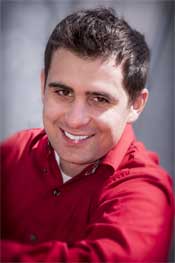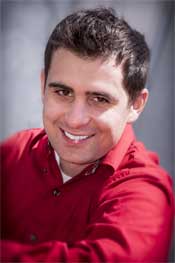 KINGSTON, R.I. – April 30, 2013 – His workout at Gold’s Gym started out as routine as any other. Matthew McFadden lifted weights, did a few pull-ups, and ran on a treadmill. He was tired, but blamed it on high school graduation jitters.
KINGSTON, R.I. – April 30, 2013 – His workout at Gold’s Gym started out as routine as any other. Matthew McFadden lifted weights, did a few pull-ups, and ran on a treadmill. He was tired, but blamed it on high school graduation jitters.
Who could know? When the fatigue finally overwhelmed him, he asked his friend to take him home. The blood vessels in his brain burst in the car, paralyzing the Cranston teen, a scholar and wrestler with dreams of becoming a doctor. The hospital staff thought he would die, but McFadden proved them wrong.
Not only did he live, he willed himself to a joyful and fulfilling life that includes this milestone: On May 19, nine years after his stroke, McFadden, now 26, will graduate with Bachelor of Interdisciplinary Studies from the University of Rhode Island’s Alan Shawn Feinstein College of Continuing Education in Providence.
His major is health services administration and that’s no surprise since his goal is to work in a health-related field, giving back to those who helped him in his long and sometimes painful recovery. He’d like to work at a physical therapy clinic or a health care agency.
“There was never a doubt in my mind that I would get a degree,” says McFadden. “The Providence campus was a great choice for me. I had to build up slowly. First one class, then two classes, then three. This semester, I’m taking five.”
He’s come a long way since that horrific day – April 14, 2004 – when he passed out and was rushed to Rhode Island Hospital. Initially, the doctors thought he had a seizure, but a CT scan revealed massive bleeding in his brain. McFadden’s mother, Donna Corvese, a nurse, recalls the devastating words from the emergency room doctor.
“Do you want us to call a priest?” the doctor asked.
“No,” Corvese said. “I want you to save my son.”
Diagnosed with an arteriovenous malformation, a congenital defect that entangles the arteries and veins, McFadden underwent seven hours of brain surgery. His friends packed the waiting room, incredulous that an ailment common among older people could strike a healthy 17-year-old.
He was in a coma for three months and emerged a different person. “I was like an infant,” he says. “I didn’t know anyone or anything.” He had to learn how to talk and walk. He couldn’t remember his mother’s name. He didn’t know his ABCs. Almost overnight, he went from 156 to 117 pounds and lost all his muscle mass.
Rehabilitation in a dozen clinics in Rhode Island and Boston was grueling, but he never gave up. As he regained his physical and mental strength, he set his sights on college.
McFadden was only two months away from his Cranston West High School graduation when he had the stroke. In fact, he had planned on attending URI in Kingston, taking classes that would prepare him for medical school.
This time, he chose the Providence campus and enrolled in 2007. He wanted to be closer to home and was also impressed with the flexible schedule for courses. He could pace himself. He also appreciated the close relationships with professors and the ability to tailor his program to meet his needs.
“Matt is truly a unique student, a motivated and hard working individual who appreciates the opportunity to be here and is taking full advantage of what URI can help him achieve,” says William Springer, an instructor in the Bachelor of Interdisciplinary program and economics department. “Rather than letting his health obstacle take away his dreams and aspirations, or feeling sorry for himself because of what he was unable to do, he has worked his way through it, not allowing it to deprive him of earning a college degree, nor of pursuing his dream to work in the health care industry. He has earned our respect in the process.”
McFadden excelled as a high school student and continued down that path in college. His grade-point average is 3.5 and he made the dean’s list nearly every semester. His senior project is about how small health clinics are dealing with electronic medical records.
“I’m really good at analyzing data,” McFadden says. “I like making reports.”
Thanks to federal grants and a scholarship provided by Alan and Lillian Feinstein through the URI Foundation, McFadden is graduating without any college debt. “I couldn’t have completed my degree without help,” he says. “I’m very grateful.”
The stroke left McFadden without peripheral vision in his right eye and some peripheral loss in his left eye, so he is unable to drive, which, for him, is a huge inconvenience. But he can walk, talk, swim, eat, laugh, give his mother a hug, and, yes, even lift weights. His optimism, determination, and selflessness shine through.
“I’m still a work in progress,” he says. “I’m not where I want to be in recovery. I want to get better and better.”
Almost dying has taught him how to live.
“Most people take things for granted, including myself before the stroke,” he says. “I could never imagine in a million years that I would not be 100 percent. Clearly, the stroke was a shock to me. You just have to go forward. I’m a very determined person.”
He keeps a photo album of “before and after” pictures: the robust high school student with a glimmer in his eye; the unconscious hospital patient connected to a maze of tubes. His mother took the hospital photo to show him when he woke up from the coma. She knew he would.
“Obviously a stroke is tough,” says McFadden, “but I’m tougher.”
Pictured above:
Matthew McFadden, a 26-year-old Cranston resident who overcame a debilitating stroke nine years ago to graduate this spring from the University of Rhode Island’s Alan Shawn Feinstein College of Continuing Education in Providence.
Photo by Michael Salerno Photography

